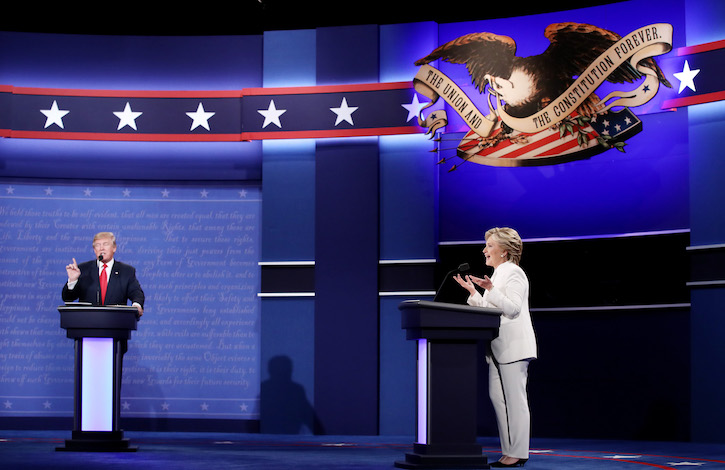
In conversation with Paulson Institute Vice Chairman Evan Feigenbaum on Friday, the two top China policymakers from the Obama and the Bush administrations—Jeff Bader (Obama) and Dennis Wilder (Bush)—agreed that the consensus on a U.S. policy on China is fraying in Washington (click for video). What will America’s China policy look like under the next U.S. president? See our handy cheat sheet below:
On the U.S.-China relationship:
Clinton:
- Clinton has said the United States and China must build trust and continue to cooperate on thorny international issues such as terrorism, climate change, and North Korea.
- In her 2014 book, “Hard Choices,” she wrote that the U.S.-China relationship is not one that “fits neatly into categories like friend or rival,” but that there are areas of contention between the two powers.
Trump:
- Trump has often framed the US-China relationship as one of rivalry and competition, and not cooperation.
- Trump has mostly focused on economic issues, frequently asserting that China has benefited at the expense of the United States.
On economics and trade:
Clinton:
- Clinton says she will hold China “accountable” for what she believes is its abuse of trade agreements and international rules.
- In a 2013 speech, Clinton said “we are in a competition for the future and we need more partners and fewer adversaries,” suggesting support for trade deals like the Trans-Pacific Partnership. But in 2015, Clinton came out against the TPP, which she says does not meet her standards for a deal that will raise living standards or enhance American security.
Trump:
- Trump has called China a currency manipulator, and says he will bring suit against China in the World Trade Organization.
- Trump has vowed to kill the Trans-Pacific Partnership trade agreement, which he says would kills U.S. jobs .
- Trump says he will impose a 45% tariff on goods imported from China. “If they don’t come to the table, they’re going to have a tax when they put their products into this country. And they’re going to behave,” he said in an interview with CBS’ “60 Minutes.”
- Trump has repeatedly stated that he will “crack down” on Chinese companies and state-entities stealing American intellectual property.
On climate change, energy, and the environment:
Clinton:
- Clinton’s plan to tackle climate change includes implementation of the Paris Climate Agreement and continuing to cooperate with China on climate change agreements.
Trump:
- Trump, who has frequently expressed skepticism that climate change is real, tweeted that the notion of global warming “was created by and for the Chinese in order to make U.S. manufacturing non-competitive” in 2012.
- Trump has threatened to “cancel” the Paris agreement on climate change.
On human rights:
Clinton:
- Clinton has often criticized China’s human rights record. As first lady, in 1995, she criticized China’s now defunct one-child policy and forced sterilizations and abortions. In 2008, Clinton called on then-President Bush to boycott the Beijing Olympics because of perceived human rights abuses in Tibet.
Trump:
- Trump has not said much about human rights in China, preferring to focus on trade and economic issues.
On military and South China Sea:
Clinton:
- Clinton pioneered the Obama administration’s “pivot” to the Asia-Pacific region, which included deepening U.S. treaties with regional partners and bilateral security alliances with Japan and South Korea.
- Clinton has said that she believes that freedom of navigation, open access to Asia’s maritime commons, and respect for international law in the South China Sea are a U.S. national interest.
Trump:
- In an interview with the New York Times in July, Trump questioned the value of the presence of U.S. military personnel in Japan and South Korea. “What are we getting out of this?” he said.
- Trump said he would take a more isolationist position and scale back U.S. military presence Japan and South Korea if the two countries do not ‘pay’ more.
- Trump has criticized China’s island building in the South China Sea, calling it “a military fortress the likes of which perhaps the world has not seen.”
On cyber theft:
Clinton:
- Clinton has said “our country will outpace this rapidly changing threat, maintain strong protections against unwarranted government or corporate surveillance, and ensure American companies are the most competitive in the world.”
- Clinton has also affirmed her belief in an “open internet abroad,” with “open flow of data across borders and access to digital markets,” implicitly rebuking the balkanized internet that China has created.
Trump:




